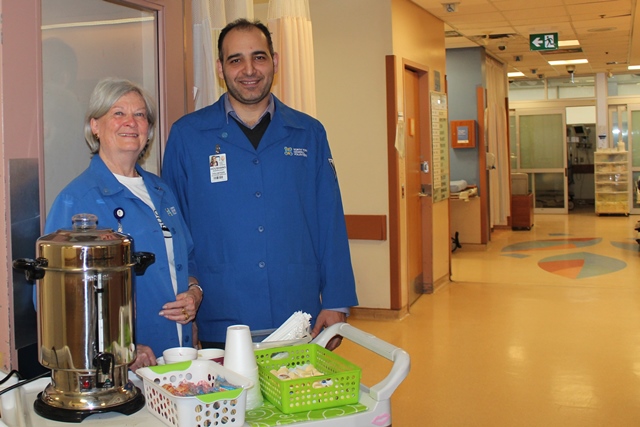
It looks like an ordinary cup of tea being offered to someone sitting at the bedside. But this simple transaction has a far greater impact than simply quenching a thirst. This cup of tea is a result of the new approach to the role of service #volunteers at #North York General Hospital (NYGH).
In January 2015, a multi-disciplinary group of NYGH staff, physicians and volunteers met to discuss new service volunteer programming that would enhance the patient and family experience. “At North York General, a patient- and family-centred approach is expected of all staff, physicians, students and volunteers,” says Sheri Loosemore, Manager, Volunteer Services. “Looking at the service volunteers’ roles from this perspective provided the hospital with an opportunity to evolve the traditionally transactional nature of the volunteer position into one which works with patients and families for greater impact.”
The brainstorming session left the newly-formed Volunteer Services Advisory Working Group with several initiatives to explore. Over the next 12 months, the Working Group took on the challenge of implementing not one, but three of these initiatives.
The first to be implemented was the ambassador program which places volunteers at the entrances to greet patients and visitors and provide them with detailed directional assistance, including walking them directly to their destination, if needed.
MORE: SMALL BOX HOLDS BIG PROMISE IN CARDIAC CARE
Another initiative which is set to launch soon is to incorporate volunteers into the Hospital Elder Life Program (HELP) – a comprehensive patient-care program that ensures optimal care for older adults while in the hospital. HELP prevents delirium, which is a sudden state of confusion or change in mental state. This program is led by staff and supported by volunteers.
The third initiative involves that cup of tea in the Emergency Department (ED).
In September 2015, the volunteers returned to the ED providing support from 9 a.m. to 9 p.m., seven days a week. Volunteers had not provided service in the ED since October 2014 due to the global Ebola crisis. This hiatus provided an opportunity to consider how volunteers could enhance the patient and family experience. Working in conjunction with the ED team, the Working Group identified several areas volunteers could improve the patient and family experience in this often difficult time.
The first was to provide all ED volunteers with Gentle Persuasive Approach training which involves learning how to use a person-centred, compassionate, gentle persuasive approach to respond respectfully to challenging behaviours. The purpose of this training is specifically to enhance the patient experience with the volunteers.
The second area of change was to move the volunteers out of triage and focus all the volunteer resources in the patient care area. There, volunteers not only visit patients as assigned, they also promote and assist patients and visitors in completing patient satisfaction surveys. Volunteers also provide wayfinding, helping patients get to where they need to be within the emergency department and other departments as needed.
Finally, volunteers are now providing refreshments to patients and their loved ones. The aim is to provide some comfort and relief to patients and families who may not want to leave the bedside for long periods of time. The ED and Volunteer Services recognize that most patients do not need to limit their intake of food or beverages and something as simple as a warm drink and a biscuit can provide much-needed comfort to someone in distress.
The positive feedback Volunteers Services has received on these initiatives has been overwhelming. The ambassador program helped guide over 8,000 visitors in its first three months, the HELP program is looking to launch imminently and the re-evaluation of the volunteer role in the ED has been a great success, from the perspective of the volunteers, the staff and physicians, and most importantly, the patients and visitors.
Patient- and Family-Centred Care at NYGH is described as partnering with patients and families; working WITH them instead of doing TO or FOR them; learning to see through the eyes of patients and families to make their experience the best it can be.
The NYGH Volunteer Services approached their new program development through that lens and has proven that when the patient comes first, everyone wins.
And sometimes all it takes is a simple cup of tea.

